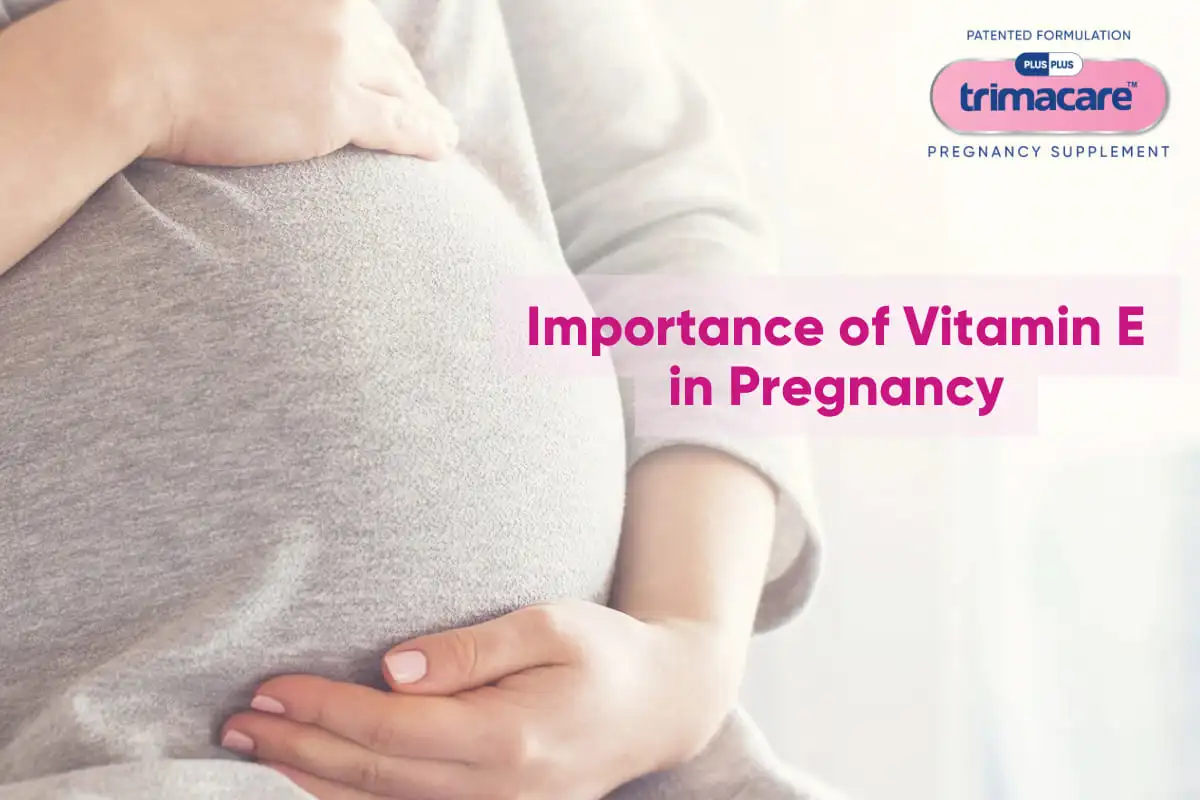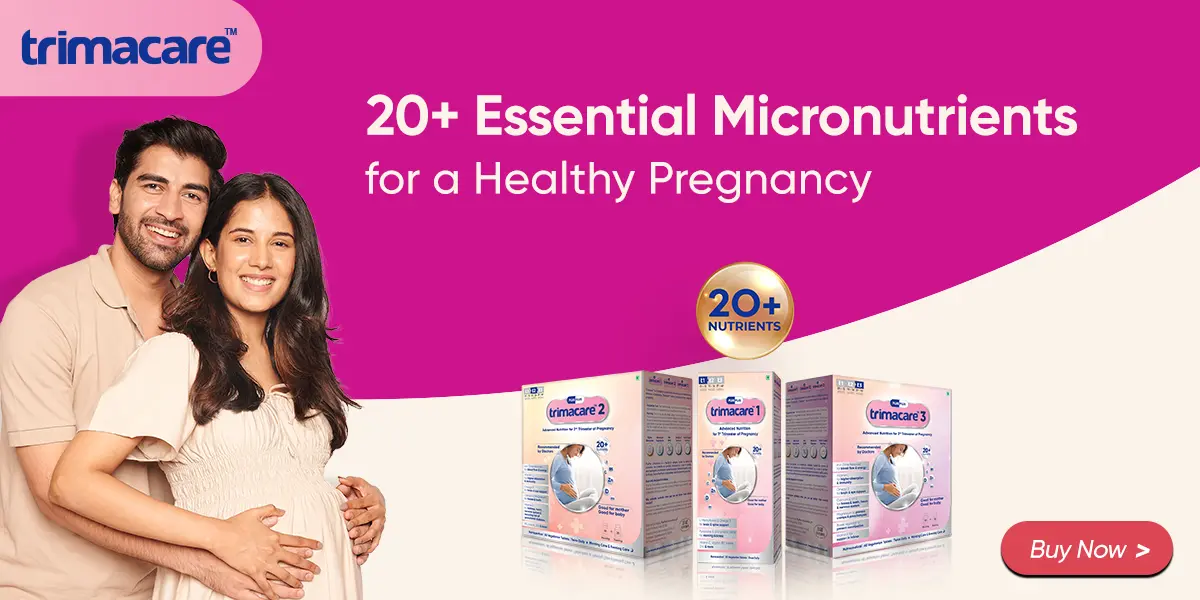Vitamin E capsule during pregnancy is essential as it helps protect cells from free radicals, supporting red blood cell production, maintaining eyes and skin, and improving the immune system in pregnancy a period of rapid cell growth. Vitamin E while pregnant is also an antioxidant and lessens oxidative stress, which is related to health conditions like pre-eclampsia, low birth weight, PROM, and chronic diseases later in life. Taking a proper and recommended amount of vitamin E in pregnancy can prevent hypertensive disorders during pregnancy.
Additionally, vitamin E for pregnancy helps in red blood cell formation, cell interaction, and immune system function. It protects the eyes from free radicals, breaks down healthy tissue, and strengthens the immune system against bacterial and viral infections.
Vitamin E deficiency during pregnancy can lead to various pregnancy-related issues, including female infertility, miscarriage, premature delivery, eclampsia, and foetal intrauterine growth restriction.
BENFEITS OF VITAMIN E FOR PREGNANT WOMAN
Vitamin E is one of the essential nutrients needed during pregnancy due to the following reasons:
- Vitamin E is one of the essential nutrients needed during pregnancy due to the following reasons:
- Vitamin E is a great antioxidant that effectively reduces oxidative stress during pregnancy.
- Vitamin E while pregnant helps in the healthy development of cells and tissues in the foetus, assisting in the formation of organs, muscles, and nerves.
- A strong immune system is important during pregnancy to save the mother and the baby from several infections and illnesses. Vitamin E capsules during pregnancy improve the functioning of the immune and offer powerful protection against various infections and diseases.
- Vitamin E while pregnant helps in the formation of red blood cells, preventing anaemia in both the mother and the baby. Anaemia during pregnancy can lead to fatigue and other complications.
- Adequate intake of Vitamin E in pregnancy is essential for the growth of the baby’s brain and nervous system. It supports cognitive functions and can contribute to long-term neurological health.
- Vitamin E capsules during pregnancy promote cardiovascular health by preventing blood clots and widening blood vessels.
- Vitamin E for pregnant women supports the health of the placenta, the organ that provides oxygen and nutrients to the foetus and removes waste products.
- While it may not entirely prevent stretch marks, Vitamin E good for pregnancy supports skin health by maintaining its elasticity. This can help reduce the severity of stretch marks during pregnancy.
- Intake of Vitamin E during pregnancy might reduce the risk of certain complications, although more research is needed in this area.
- Vitamin E in pregnancy also strengthens the immune system, which helps protect against viruses and germs.
DEFICIENCY OF VITAMIN E AND PREGNANCY
- Deficiency of Vitamin E during pregnancy can have serious side effects on both the mother and the developing foetus. Here’s what you need to know about the potential consequences of vitamin E deficiency during pregnancy:
- Increased Risk of Complications: Deficiency of Vitamin E capsules during pregnancy may increase the risk of complications, including pre-eclampsia (a condition characterized by high blood pressure and organ damage), preterm birth, and low birth weight.
- Impaired Foetal Development: Folic acid and Vitamin E during pregnancy are essential for the proper development of the foetus, including the formation of organs and tissues. A deficiency can impair foetal growth and lead to developmental abnormalities.
- Weakened Immune System: Lack of Vitamin E in pregnant women can weaken the immune system, making the mother and the baby more susceptible to infections and illnesses. This weakened immunity can lead to complications and delayed recovery from infections.
- Anaemia: A deficiency of Vitamin E while pregnant can contribute to anaemia, a condition characterized by a lack of healthy red blood cells. Anaemia can cause fatigue, weakness, and shortness of breath, affecting the overall well-being of the mother and the baby.
- Neurological Issues: Vitamin E during pregnancy is important for neurological development. A deficiency during pregnancy can lead to problems in the developing nervous system, potentially impacting the baby’s cognitive and motor skills.
- Muscle Weakness: Severe Vitamin E deficiency in pregnancy can lead to muscle weakness and coordination problems. This can impact the mother’s ability to carry out daily activities and may affect the baby’s motor development.
- Vision Problems: Insufficient intake of Vitamin E while pregnant can lead to vision problems in newborns, including retinopathy (damage to the retina of the eyes). Proper levels of vitamin E are essential for the development and maintenance of healthy vision.
- Neurological Issues: Vitamin E during pregnancy is important for neurological development. Vitamin E deficiency during pregnancy can lead to problems in the developing nervous system, affecting the baby’s cognitive and motor skills.
- Muscle Weakness: Severe deficiency of Vitamin E in pregnancy can lead to muscle weakness and coordination problems. This can affect the mother’s ability to carry out daily activities and may hinder the baby’s motor development.
- Vision Problems: Insufficient intake of Vitamin E while pregnant can lead to vision problems in newborns, including retinopathy (damage to the retina of the eyes). Proper levels of vitamin E are essential for the development and maintenance of healthy vision.
FOLIC ACID AND VITAMIN E FOR PREGNANCY
Folic acid is crucial during early pregnancy, reducing the risk of neural tube defects. It supports the baby’s spinal cord and brain development. Vitamin E good for pregnancy also helps in overall foetal growth and protects cells. Together, folic acid and vitamin E for pregnancy play vital roles in ensuring a healthy pregnancy and development of the baby.
TRIMACARE PRENATAL TABLETS: BEST SUPPLEMENT FOR VITAMIN E FOR PREGNANT WOMAN
Intake of Vitamin E capsules during pregnancy helps brain growth, reduces miscarriage risk, and strengthens the immune system, helping in red blood cell formation, eye, and skin maintenance.
Vitamin E is crucial for preventing and treating placental ageing hypertensive conditions like preeclampsia, miscarriage, and premature birth. Trimacare prenatal multivitamin is designed for Indian pregnant women and their unborn children, providing trimester-specific care to protect against negative pregnancy symptoms and promote the healthy growth of their babies.
Trimacare pregnancy supplements are designed to meet Indian mothers recommended daily allowances (RDAs). Trimacare pregnancy multivitamin contains 20 Plus Nutrients is a stomach-friendly, salt-formulated, and high-absorption prenatal vitamin tablet that includes essential nutrients like folate, omega-3s, and Vitamin E, making it the only prenatal tablet needed for pregnancy.
Frequently Asked Questions:
- Vitamin E during pregnancy: What is the benefit?
Vitamin E saves from free radicals, enhances immunity, and promotes the development of the brain and eyesight in the foetus of a pregnant woman.
- How much vitamin E should I take per day during pregnancy?
During pregnancy, the RDA of vitamin E is 15 milligrams or 22.4 IU; however, these must be derived from your specific requirements as recommended by the doctor.
- Is it possible to get enough vitamin E from the diet during pregnancy?
The diet can be well balanced, with plenty of sources like nuts, seeds, green leafy vegetables, and fortified cereals. Still, some pregnant women may need supplementation to fulfil their needs, especially if they have some health conditions or dietary restrictions.
- Are there risks to the excessive intake of vitamin E in pregnancy?
Taking too many vitamin E supplements during pregnancy can cause problems with blood clotting and other complications like bleeding disorders. It is good to advise you to consult your doctor before taking any supplement.
- What are some foods that I should avoid during pregnancy because they may interfere with the absorption of vitamin E?
Vitamin E absorption can be inhibited by a variety of substances, including cholesterol-lowering medications and large amounts of polyunsaturated fats. During pregnancy, it is good to maintain a balanced diet and discuss any potential interactions about medications or dietary habits with your doctor.
A Certified Nutritionist with a rich healthcare background in health journalism, the author has immense experience in curating reader-friendly, engaging, and informative healthcare blogs to empower readers to make informed pregnancy-related decisions.












